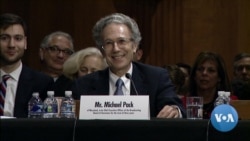Two bills approved by Congress awaiting President Donald Trump’s signature would limit the powers of Michael Pack, the president’s pick to lead the U.S. Agency for Global Media, which oversees Voice of America and four other international media organizations.
A massive spending measure for COVID-19 relief and U.S. government operations approved late Monday by Congress and a previously approved National Defense Authorization Act both include changes limiting the powers of the USAGM and its chief executive, but in different ways.
The two bills taken together could restrict Pack’s actions between now and January 20, when Democratic President-elect Joe Biden takes office. And if Biden decides to replace Pack, it would provide that person with more leeway in making personnel changes for the first three months.
For example, the spending measures approved by the House and Senate on Monday include a provision that would give the Open Technology Fund more time to respond to a USAGM letter proposing that the internet freedom fund be denied additional federal funding.
Pack cited alleged conflicts of interest and alleged irregularities in his proposal to cut off future federal funds to the nonprofit organization that helps support internet access throughout the world.
The massive spending legislation would also temporarily pause for 90 days NDAA provisions mandating the formation of new USAGM advisory boards and regulations for how network heads can be hired and fired.
If both bills are signed by the president and if Biden nominates a new leader for USAGM, Pack’s successor would have broader powers to appoint and remove network agency leaders at the beginning of his or her tenure. Once the 90-day NDAA pause ends, the new CEO would need the approval of a majority of the agency advisory board to hire or remove network leaders.
A spokesperson for the Biden presidential campaign in June told a reporter for the website VOX that, if elected, Biden would dismiss the USAGM’s current head.
The transition team for President-elect Biden declined to comment to VOA.
Heads of RFA, MBN announced
Pack, who took charge of USAGM in June after a prolonged Senate confirmation battle, has been criticized by lawmakers over a series of actions including his firing of the heads of three network divisions in his first week, attempts to withhold funds from the OTF, and failure to renew J-1 visas – a specialized entry permit for individuals with unique skills that allows international journalists to work in VOA’s language services.
In December, Pack appointed new heads to VOA, Radio Free Europe/Radio Liberty, the Office of Cuba Broadcasting, Radio Free Asia (RFA) and the Middle East Broadcasting Network (MBN).
The latter two appointments were announced Tuesday evening. Victoria Coates, a senior policy adviser to Congress and the White House, will be president of MBN and Stephen Yates, a former deputy national security adviser in the Office of the Vice President and language analyst at the U.S. Department of Defense, will be president of RFA.
Lawmakers, including House Foreign Affairs Committee chair Eliot Engel, a Democrat from New York, and ranking Republican Michael McCaul of Texas have raised concerns over the suitability of some of the choices.
USAGM said it was unable to immediately respond to VOA’s queries.
Other provisions in the National Defense Authorization Act include preventing the CEO or federal employees from serving on a grantee board and a requirement that board members have expertise in journalism, technology or diplomacy.
Extension for OTF Debarment Response
The spending package approved Monday also explicitly gives the OTF 90 days to respond to the proposed debarment that would strip it of federal funding. In a December 15 letter informing the OTF of the proposed action, USAGM gave the grantee 30 days to respond.
In the letter, Pack cited alleged conflicts of interest and irregularities identified by McGuireWoods, a private law firm hired to carry out compliance reviews, as reason for the proposed debarment. OTF disputes the allegations.
OTF president Laura Cunningham told VOA the move was an attempt to “destroy OTF by hijacking and weaponizing a process intended to protect the public interest.”
The OTF welcomed the extension granted by the spending bill.
“That a bicameral, bipartisan group of lawmakers was able to come together at the highest level on such a short timeline to take this action, is an incredible demonstration of their commitment to protect internet freedom and their support for OTF,” Cunningham told VOA.
Over 2 billion people globally use tools and technologies supported by OTF, according to the USAGM website, including popular encryption tools like Signal and the Tor Project. With a focus on open-source technology, the OTF helps journalists and activists circumvent surveillance and censorship.

